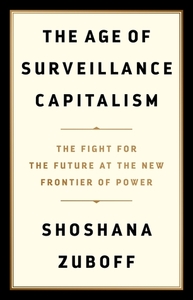Take a photo of a barcode or cover
663 reviews for:
The Age of Surveillance Capitalism: The Fight for a Human Future at the New Frontier of Power
Shoshana Zuboff
663 reviews for:
The Age of Surveillance Capitalism: The Fight for a Human Future at the New Frontier of Power
Shoshana Zuboff
challenging
informative
inspiring
slow-paced
This is an incredibly important book. While Zuboff occasionally belabors the point, their passion and alarmism is not misplaced, as the threats to privacy and self-determination from Big Tech are already well advanced, and threaten the very fabric of democracy. A wake up call.
challenging
informative
reflective
slow-paced
I enjoy knowing this subject matter but it is exceptionally dense and kind of miserable to read about
Been a long ride, but definitely worth it! Still learn a lot even though I’m familiar with “Oh big techs are all collecting our data” Some quick takeaways, though definitely not exhaustive.
“Who knows, who decides, and who decides who decides” This book revolves around this concept of how data can be handled, yet extended beyond into reality to discuss two fundamental rights: the right to future tense and the right to sanctuary. Ultimately, the big philosophical question is whether we should abandon “free will” if doing so results in more efficiency as a whole.
The author emphasizes the need to understand “Surveillance Capitalism” from its roots & history both from spiritual, economy, and political side. Good example of when people didnt know how to react to totalitarianism when it first came out results in no resistance and even support. Understanding what it really is will shape how we ask questions for example: asking “how much would you sell your private data for” may not even be appropriate..
Technology itself is not surveillance Capitalism, but a tool, hence we can definitely reimagine how society is currently structured now. Like how capitalism without control can destroy nature, surveillance capitalism without control can destroy the essence of human. Like how capitalism creates division of labor, and shape the society of status quo, surveillance capitalism creates division of knowledge creating “God” and Human as a whole unit, not as an individual being. “God” has knowledge of how to make the human hive behave with as much certainty as possible to satisfy the stakeholder, including shrinking the space individual has internally to really be themselves. They don’t care why you do that, as long as the result makes them better off. Oh also metadata is v underrated!
The ability of surveillance capitalism in avoiding our perception or awareness is what is necessary for harvesting our knowledge for their use.
Though some chapters feel quite redundant in terms of communicating the same concept, I love more real-world examples, so still giving this a 5!
“Who knows, who decides, and who decides who decides” This book revolves around this concept of how data can be handled, yet extended beyond into reality to discuss two fundamental rights: the right to future tense and the right to sanctuary. Ultimately, the big philosophical question is whether we should abandon “free will” if doing so results in more efficiency as a whole.
The author emphasizes the need to understand “Surveillance Capitalism” from its roots & history both from spiritual, economy, and political side. Good example of when people didnt know how to react to totalitarianism when it first came out results in no resistance and even support. Understanding what it really is will shape how we ask questions for example: asking “how much would you sell your private data for” may not even be appropriate..
Technology itself is not surveillance Capitalism, but a tool, hence we can definitely reimagine how society is currently structured now. Like how capitalism without control can destroy nature, surveillance capitalism without control can destroy the essence of human. Like how capitalism creates division of labor, and shape the society of status quo, surveillance capitalism creates division of knowledge creating “God” and Human as a whole unit, not as an individual being. “God” has knowledge of how to make the human hive behave with as much certainty as possible to satisfy the stakeholder, including shrinking the space individual has internally to really be themselves. They don’t care why you do that, as long as the result makes them better off. Oh also metadata is v underrated!
The ability of surveillance capitalism in avoiding our perception or awareness is what is necessary for harvesting our knowledge for their use.
Though some chapters feel quite redundant in terms of communicating the same concept, I love more real-world examples, so still giving this a 5!
challenging
informative
slow-paced
Surveillance capitalism is the business of taking people's data and turning it into profits.
-All aspects of the human experience are turned into data and sold to a variety of businesses for a variety of reasons.
- Prior changes to capitalism helped loosen regulations and change attitudes for the online age.
- Early concerns about online privacy were dashed in favor of loose surveillance laws.
- Google's street view and Glass operations are great examples of outrage turning to acceptance
- Surveillance capitalism is getting more granular in their data collection
- Surveillance capitalists hope to identify key moments of sensitivity in order to increase the chances of purchase and behavior modification.
- The invasive, all-controlling future of surveillance capitalism doesn't have to be seen as inevitable
- Surveillance capitalism isn't "inevitable" and people aren't ready and willing to give up privacy in the name of convenience.
-All aspects of the human experience are turned into data and sold to a variety of businesses for a variety of reasons.
- Prior changes to capitalism helped loosen regulations and change attitudes for the online age.
- Early concerns about online privacy were dashed in favor of loose surveillance laws.
- Google's street view and Glass operations are great examples of outrage turning to acceptance
- Surveillance capitalism is getting more granular in their data collection
- Surveillance capitalists hope to identify key moments of sensitivity in order to increase the chances of purchase and behavior modification.
- The invasive, all-controlling future of surveillance capitalism doesn't have to be seen as inevitable
- Surveillance capitalism isn't "inevitable" and people aren't ready and willing to give up privacy in the name of convenience.
dark
informative
reflective
sad
slow-paced
This book felt important, but it was a real slog to get through. There is a lot of interesting food for thought here, and it exposes and analyzes a lot of truly disturbing practices and trends, but it also appears overly alarmist at times, employing hysterically hyperbolic language to describe things that seem obviously terrible to the author, without having convincingly made the case. It has nonetheless inspired me to add some additional privacy-related extensions to my browser, and I will think carefully before installing any new unnecessarily internet-connected devices in my home (while continuing to use the ones I have, though).
challenging
informative
slow-paced
"Olvídense del tópico de que si algo es gratis, es porque ustedes son el producto. Ustedes no son el producto; son el cadáver abandonado. El «producto» es lo que se fabrica con el excedente que han arrancado de sus vidas."






